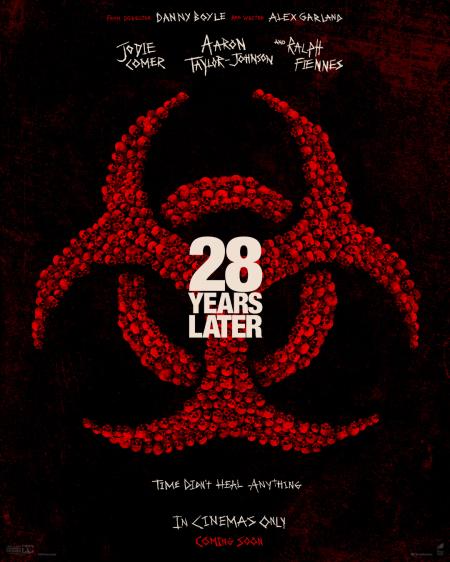Rating of
3/4
"Memento mori debes (remember you must die)."
Matthew Brady - wrote on 08/05/25
Ever since I watched 28 Days Later and 28 Weeks Later around 2008 or 2009, I've heard rumours about a third instalment in the series, possibly called 28 Months Later, which might take place in Paris. I've seen fan-made posters imagining what that film could look like. However, there have been no new developments for years—just ongoing discussions suggesting it could happen. This franchise, which reshaped the zombie genre, has had a noticeable impact on many zombie-related media. Then, almost out of nowhere, we're not only getting a new movie but a trilogy with director Danny Boyle and writer Alex Garland returning. The excitement and interest alone from that announcement were enough. Still, the first trailer, with the haunting and tense audio of the poem "Boots" by Rudyard Kipling, read by Taylor Holmes, was one of the best trailers in recent memory. It made "28 Years Later" my most anticipated movie of 2025.
28 Years Later was a rollercoaster of a film that did something I didn’t expect from a third instalment in this series: it hit me emotionally. One of the central themes is about love and finding beauty even in tough times. I honestly didn’t expect to cry or be so moved by it. Not only does it have brains, but it also has a heart and soul.
I loved it. It’s been on my mind for days after watching. It’s not for everyone, that’s for sure. It’s a trippy coming-of-age story told from the perspective of a 12-year-old boy trying to navigate this strange and terrifying life. It’s almost punk rock in its filmmaking and editing.
Boyle and Garland didn’t come back after a long break to repeat themselves. If they had, it would have been just another tired zombie movie. Or if they had gone with the infected taking over the Paris storyline again, it would just be another zombie film because you have seen that before. The zombie genre is one of the most popular, but it’s become so overdone that audiences recognize the tropes and structure.
Instead, the film is full of compelling ideas and themes that I found engaging, exploring what it could mean and expanding the lore of this world. It strikes a unique balance, making this world feel both otherworldly and very grounded.
It draws influence from real-world events such as COVID-19 and Brexit. In this third instalment, the British Isles are in quarantine while mainland Europe remains virus-free and normal. The UK has struggled to contain a deadly virus. Sound familiar? I remember when New Zealand was COVID-free for a while, when everything felt normal because they closed their borders and enforced tight quarantines while other countries struggled. So, even if it is just a movie, these scenarios are more believable now.
All the performances were excellent. Jodie Comer is outstanding as Isia, a woman suffering from an undiagnosed illness since there are no doctors among the survivors. She experiences confusion, mood swings, and headaches. She has a son named Spike, whose bond with her provides the emotional core of the story.
Speaking of Spike, Alfie Williams delivers a terrific performance. Even at such a young age, he carries much of the emotional weight of the story and his character. It is arguably the best child acting in this series, especially compared to the weaker child performances seen in 28 Days Later and 28 Weeks Later.
Ralph Fiennes is excellent here. His character, Dr. Kelson, is a mysterious doctor who appears in the third act. Everything about him is intriguing—how he views the infected and death itself. He built a temple out of bones of burned bodies, like the Catacombs of Paris. The temple honours the dead and emphasizes that the infected and uninfected are not different. Fiennes nearly steals the show.
Finally, Aaron Taylor-Johnson as Jamie, a flawed but complex father to Spike, delivers a strong performance. Aaron is only in the first act of the film, which focuses on tough love between father and son. Aaron plays the role well, and his accent makes his lines memorable.
The soundtrack by the hip-hop group Young Fathers was excellent. I’d never heard of them before this film, but they created a unique mix of sounds—some that make you want to head-bang, others that move you, and some that generate tension or dread.
The use of music is interesting, often purposely mismatched with the scene to create unease. Something horrific might unfold, but the music maintains a cheerful tone. For example, in the opening scene with the Teletubbies massacre and the church flashback at the outbreak's start, the music makes the infected seem almost blessed or fortunate—a strange but somewhat comforting perspective on the outbreak, like a necessary evil, all conveyed through the music. These choices evoke an uncanny feeling, like the horrors we face in life, where we sometimes don’t know how to feel or what to think.
The film centres on various themes, with memory being the most prominent, covering both the time before the outbreak and how media, toys, British culture, or symbols can trigger those memories. It frequently shows clips of iconic British media, like Laurence Olivier’s Henry V, WWI soldiers, a portrait of Queen Elizabeth, and Rudyard Kipling’s poem "Boots," read aloud by Taylor Holmes. These elements evoke Britain’s identity and its golden days, acting as the only links to life before the outbreak. But there are also memories from the past of personal lives. When Isla, whose illness warps her perception, recalls her past, she often feels grateful, saying, “Thank you, Dad,” when others show her kindness. Though it may seem funny at first, this reflects a tender memory of her father’s care. Even amid loss, their presence persists through others, highlighting that kindness and love should remain vital, not just relics of the past, in this new world.




